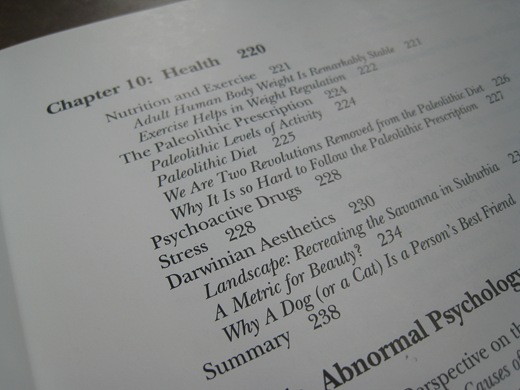I am often asked if there were any parts of my training in social psychology that were influential on the way that I now view my road to health.
I always think back to a course that I took during my 3rd year of my undergraduate program called Evolutionary Psychology. This course was in part responsible for the gradual shift in my disordered eating behaviours. It helped me view my body in a new light and to appreciate why certain frustrating behaviours (like binging and over-eating) were happening.
This is one of my favourite books of all time:

And trust me, I cannot say this about 99% of the textbooks I purchased during my undergrad and grad school careers. The book is short, clear, concise, and can be easily understood by someone without psychology training.
Given that the back-to-school season is upon us, I thought it would fun to host a series of educational workshops about our health, pulling from interesting topics that I have covered in some of my classes.
What is Evolutionary Psychology?
Evolutionary Psychology is a division of psychology that focuses on how our traits and behaviours evolve because of natural selection. Natural selection is the term coined by Darwin, to describe the process by which adaptive traits are ‘selected for’ (i.e., continue to reproduce in a species) while maladaptive traits (i.e., traits/behaviours that do not help a species survive) die out.
My Evolutionary Psychology course was one of my favourite courses that I have taken over the 7 years of my training.
My instructor was everything you would dream an instructor of evolutionary psychology would be: Extremely quirky, tall, lanky, overgrown grey hair, and extremely off-beat yet highly intelligent and amusing. One class he even brought his pet Parokeet to teach a lecture with him! Not surprisingly, his Parokeet could speak many words and was very smart.
To start off, I would like to focus on Chapter 10: Health.

Not surprisingly, this was my favourite chapter in the entire book. I have read it many times over. It was also partly responsible for the slow and gradual change in my road to health.
Why Diets Fail
Then + Now:
- Our ancestors were generally quite fit, lean, and were capable of remarkable feats of athleticism. Contrast this with our current society, and you will see that over half of men and women are either overweight or obese.
- Despite the fact that the diet industry is growing and growing each year, 95% of all diets fail, with most individuals either not loosing weight or gaining back the weight they lost within 1 year.
Why do diets fail?
Adult Human Body Weight Is Remarkably Stable.
- Generally speaking, adult human body weight is very stable! The body strives to maintain its’ current weight.
- Our weight tends to stay quite stable over a period of time, even despite the fact that what we eat daily tends to vary greatly from day to day.
- The mechanism that keeps our weight constant, despite these daily fluctuations, is also the same thing that makes it hard for people to lose weight.
Body Weight is maintained by a feedback system with a setpoint!
- A setpoint is what I like to call a body’s happy weight. It is the point where your weight naturally tends to fall when you aren’t giving a great deal of effort via exercise and diet to lose weight.
- For example, rats and humans who have been starved below their setpoint will eat more food once it is readily available until they regain to the setpoint weight.
- When someone is eating above their set point weight, it is common for the body to compensate by eating less food to return to the setpoint. You probably have experienced this over the holidays when you have a few days or weeks of over-indulging and you find that afterward all you crave are salads and fruit! This is your bodies way of returning you to its setpoint weight.
- This setpoint regulation system operates at a subconscious level. In other words, it will operate without us ever having to give it any thought. That is, unless we start to mess with the system by dieting and obsessing!
- The books authors, Gaulin & McBurney, say that our bodies regulation system is a very adaptive mechanism and we take it for granted. If we didn’t have this natural tendency to eat more when we need to gain weight or to eat less when we need to return to our setpoint, we would either waste away or eat until we are obese.
What happens when going on a diet:
- When people go on a diet, they often find that their weight drops at first, but then the weight loss plateaus.
- Our bodies respond to a diet by first dropping our metabolic rate. The result is that we now burn fewer calories than we did before = NOT GOOD!
- When our bodies drop the metabolic rate, this is a signal that our bodies are resisting weight loss. Our bodies do not want to be in a state of imbalance. All it wants to do is maintain its weight at the set point.
- It is very frustrating because even though we are eating much less than we did prior to the diet, we are still not losing weight.
- We are hungry all. the. time.
- If that wasn’t bad enough, when we do eat more, our weight will often climb higher than it was previously because of our now reduced metabolic rate.
- This is an evolutionary adaptation that permitted our ancestors to survive during long periods of famine. When our bodies think it is in a famine, the metabolic rate plummets and we function and maintain our weight even though we aren’t eating a fraction of what we used to. The result is an often irritable and unhappy dieter confused and desperate.
As a result of these evolutionary mechanisms to maintain our weight, it is very hard to go on a reduced-calorie diet and lose weight successfully for the long-term.
However, while the odds are stacked against individuals looking to lose weight, there is hope.
In the next post of this series, I will tell you one thing that you can do to overcome this frustrating setpoint system and be successful in healthy weight loss and maintenance.

Have you experienced this frustration when trying to lose weight?
Do you think your body has a setpoint weight? Why or why not?




This is great. That is exactly what I have done in the past and that is exactly what has happened. I can’t wait to read the rest.
This is such an interesting post. So what is it that makes us eat beyond our set point? Does that mean we’re not listening to our bodies well enough, or are our bodies not telling us when we need to stop?